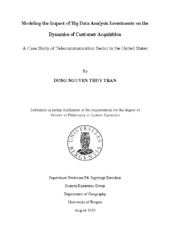Modeling the Impact of Big Data Analysis Investments on the Dynamics of Customer Acquisition: A Case Study of Telecommunication Sector in the United States
Master thesis
Permanent lenke
https://hdl.handle.net/1956/23934Utgivelsesdato
2020-09-02Metadata
Vis full innførselSamlinger
- Department of Geography [634]
Sammendrag
In the age of data explosion, many firms are heavily investing in big data and big data analytics (BDA) without being able to anticipate how much value they will receive. Thus, there is a growing body of research that has been focusing on the impact of big data and BDA investments on firm performance. Nevertheless, most of these studies use self-reported data and none of them has addressed the dynamics in the firm outcomes as well as the continuous feedback processes between BDA investment, firm performance, and other intermediate variables. In this thesis, I collected data about two telecommunication firms in the U.S., namely T-Mobile and Verizon, to build up a system dynamics model that helps to answer two research questions that have not been properly investigated hitherto: 1) How do BDA investments dynamically influence firm performance? and 2) Which policies can help large and small firms to enhance the outcomes of their BDA investments? My simulation results reveal that when the industry develops in favor of BDA activities (i.e., lower data acquisition and data storage costs, more data generated by customers), small firms will be put at a disadvantage. In contrast, large firms with larger customer bases will be able to exploit their economies of scale in BDA investments to quickly increase their market share and gain higher profits. Thus, large firms are advised to increase their investments in BDA and data acquisition, in addition to increase their data volume more quickly even at the cost of lower data quality. As an increase in data volume will typically lead to a decrease in data storage cost, this policy will help large firms effectively increase their total number of customers, which will lead to a further decrease in the data acquisition cost, resulting in higher firm revenues and firm profits. Small firms, instead, are advised to sacrifice their profits for market share. Specifically, they should invest more heavily than large firms to lift the volume of their data up to the point that it can nullify the cost advantage of large firms. It is unclear that, though, whether small firms can survive when making such a big trade-off. Future research might explore whether the intervention from governments might help resolve this inequality between small and large firms.
